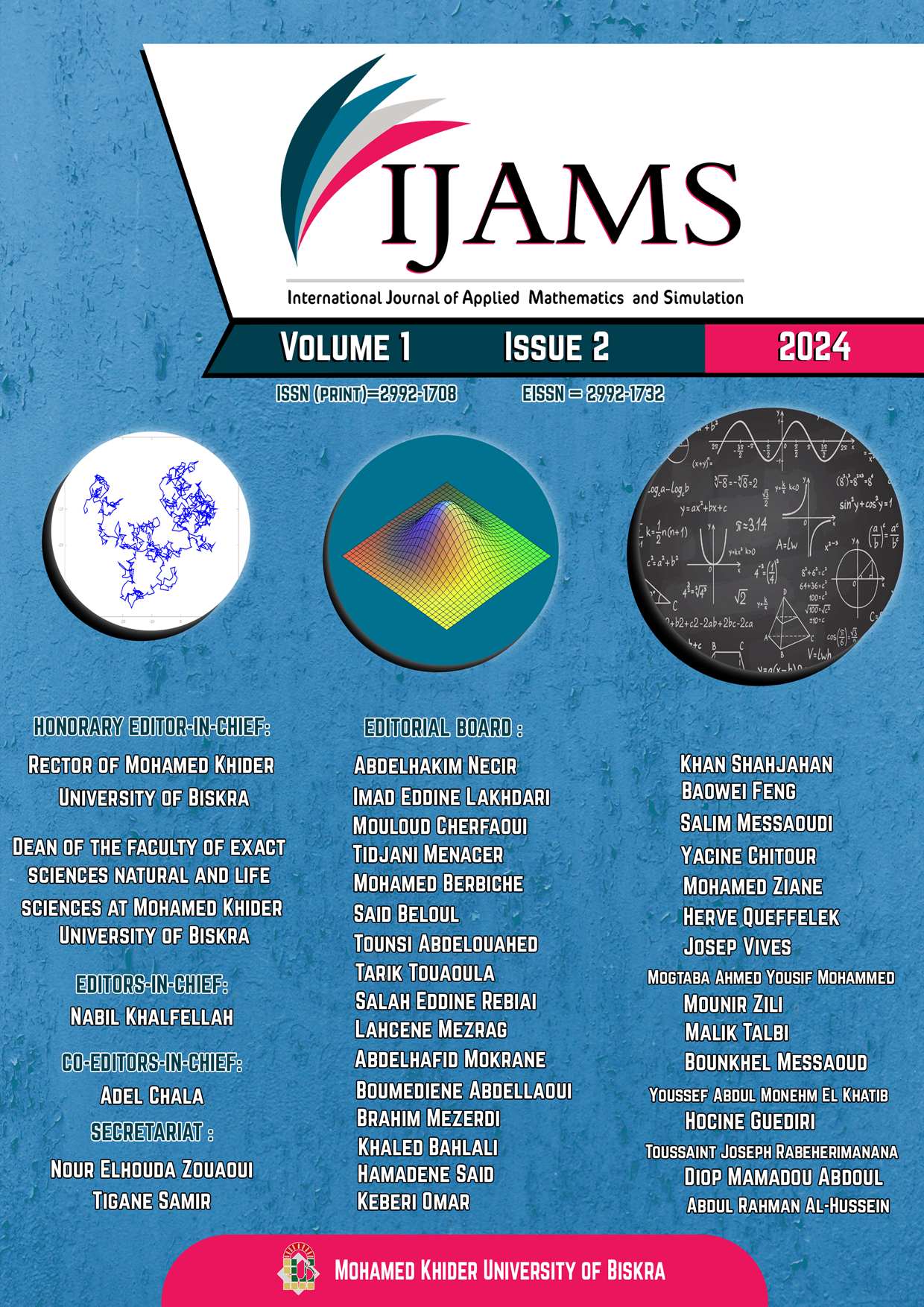Bat Algorithm for Solving IVPs of Current Expression in Series RL Circuit Constant Voltage Case
Résumé
In this paper, an efficient method for solving Initial Value Problems (IVPs) in Ordinary Differential Equations (ODEs) used in the fields of electronics and electrical engineering is demonstrated. The method is based on the Bat-Inspired Algorithm (BA), which simulates the echolocation navigation system used by bats to detect and pursue their prey. In the case of constant voltage, the IVPs arise from an RL circuit consisting of a resistor and an inductor connected in series. The suggested method’s usability and effectiveness are confirmed by the experimental results obtained by numerical example. The findings reveal that the BA algorithm produces a satisfactory and precise approximation of the answers when compared to the exact solution in terms of solution quality.
Keywords: Bat Algorithm (BA), Initial Value Problems (IVP), Series RL circuit
MSC: 65-05, 65L05, 65D99.
REFERENCES
[1] Atangana, A., & Nieto, J. J. (2015). Numerical solution for the model of RLC circuit via the fractional derivative without singular kernel. Advances in Mechanical Engineering, 7(10), 1687814015613758. Search in Google Scholar. https://doi.org/10.1177/1687814015613758
[2] Askarzadeh, A. (2016). A novel metaheuristic method for solving constrained engineering optimization problems: crow search algorithm. Computers & structures, 169, 1-12. Search in Google Scholar. https://doi.org/10.1016/j.compstruc.2016.03.001
[3] Chakri, A., Khelif, R., Benouaret, M., & Yang, X. S. (2017). New directional bat algorithm for continuous optimization problems. Expert Systems with Applications, 69, 159-175. Search in Google Scholar. https://doi.org/10.1016/j.eswa.2016.10.050
[4] Dorigo, M. (1996). The Ant System: Optimazation by a colony of cooperation agents. IEEE Trans. Systems, Man and Cybernetics Part B, 26(1), 113. Search in Google Scholar. view article.
[5] Djerou, L., Khelil, N., & Aichouche, S. (2017). Artificial bee colony algorithm for solving initial value problems. Communications in Mathematics and Applications, 8(2), 119.Search in Google Scholar. View article .
[6] Fister Jr, I., Fister, D., & Yang, X. S. (2013). A hybrid bat algorithm. arXiv preprint arXiv:1303.6310.
[7] Goldberg, D. E. (1989). Genetic Algorithm in Search, Optimization and Machine Learning, Addison. W esley Publishing Company, Reading, MA, 1(98), 9. Search in Google Scholar.
[8] Henrici, P. (1964). Elements of numerical analysis. (No Title). Search in Google Scholar. View
[9] Holland, J. H. (1975). Adaptation in natural and artificial systems. University of Michigan Press google schola, 2, 29-41. Search in Google Scholar.
[10] Horowitz, P., Hill, W., & Robinson, I. (1989). The art of electronics (Vol. 2, p. 658). Cambridge: Cambridge university press. Search in Google Scholar. View book.
[11] W. N. James, S. A Riedel, (2015). Electric Circuits. Prentice Hall Publisher.
[12] Karaboga, D., & Basturk, B. (2007). A powerful and efficient algorithm for numerical function optimization: artificial bee colony (ABC) algorithm. Journal of global optimization, 39, 459-471. Search in Google Scholar. https://doi.org/10.1007/s10898-007-9149-x
[13] Kennedy, J., & Eberhart, R. (1995, November). Particle swarm optimization. In Proceedings of ICNN'95-international conference on neural networks (Vol. 4, pp. 1942-1948). ieee. Search in Google Scholar. https://doi.org/10.1109/ICNN.1995.488968.
[14] Meng, X. B., Gao, X. Z., Liu, Y., & Zhang, H. (2015). A novel bat algorithm with habitat selection and Doppler effect in echoes for optimization. Expert Systems with Applications, 42(17-18), 6350-6364. Search in Google Scholar. https://doi.org/10.1016/j.eswa.2015.04.026
[15] Mateescu, G. D. (2005). Optimization by using evolutionary algorithms with genetic acquisitions. Journal for Economic Forecasting, 2(2), 26-30. Search in Google Scholar. Ideas.
[16] Nitesh Sureja, N. (2012). New Inspirations in Nature: A Survey International Journal of Computer Applications & Information Technology Vol. I. Issue III. Search in Google Scholar.
[17] Jordehi, A. R. (2015). Chaotic bat swarm optimisation (CBSO). Applied Soft Computing, 26, 523-530. Search in Google Scholar. https://doi.org/10.1016/j.asoc.2014.10.010
[18] Xie, J., Zhou, Y., & Chen, H. (2013). A novel bat algorithm based on differential operator and Lévy flights trajectory. Computational intelligence and neuroscience, 2013(1), 453812. Search in Google Scholar. https://doi.org/10.1155/2013/453812.
[19] Yang, X. S. (2020). Nature-inspired optimization algorithms. Academic Press. Search in Google Scholar.
[20] Yang, X. S. (2012, September). Flower pollination algorithm for global optimization. In International conference on unconventional computing and natural computation (pp. 240-249). Berlin, Heidelberg: Springer Berlin Heidelberg. Search in Google Scholar. https://doi.org/10.1007/978-3-642-32894-7_27.
[21] Yang, X. S., & Hossein Gandomi, A. (2012). Bat algorithm: a novel approach for global engineering optimization. Engineering computations, 29(5), 464-483. Search in Google Scholar. https://doi.org/10.1108/02644401211235834.
[22] Yang, X. S. (2010). Nature-inspired metaheuristic algorithms. Luniver press. Search in Google Scholar. View a book
[23] Yang, X. S. (2010). A new metaheuristic bat-inspired algorithm. In Nature inspired cooperative strategies for optimization (NICSO 2010) (pp. 65-74). Berlin, Heidelberg: Springer Berlin Heidelberg. Search in Google Scholar. https://doi.org/10.1007/978-3-642-12538-6_6.
[24] Yılmaz, S., & Küçüksille, E. U. (2015). A new modification approach on bat algorithm for solving optimization problems. Applied Soft Computing, 28, 259-275. Search in Google Scholar. https://doi.org/10.1016/j.asoc.2014.11.029.
Communicated Editor: Mohamed Berbiche
Manuscript received Mar 28, 2024; revised Nov 20, 2024; accepted Dec 03, 2024; published Dec 07, 2024.



